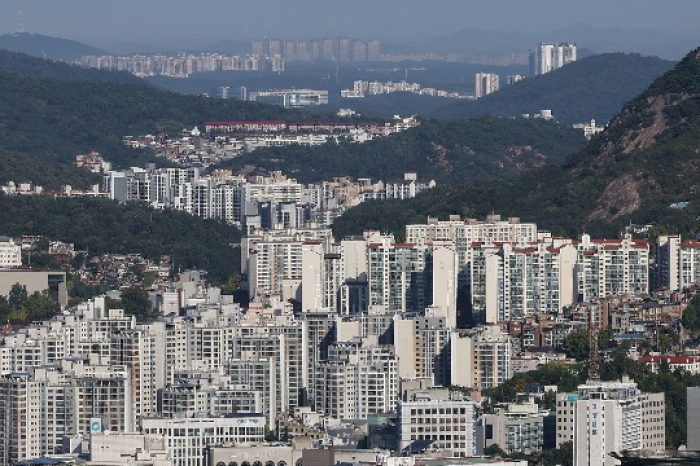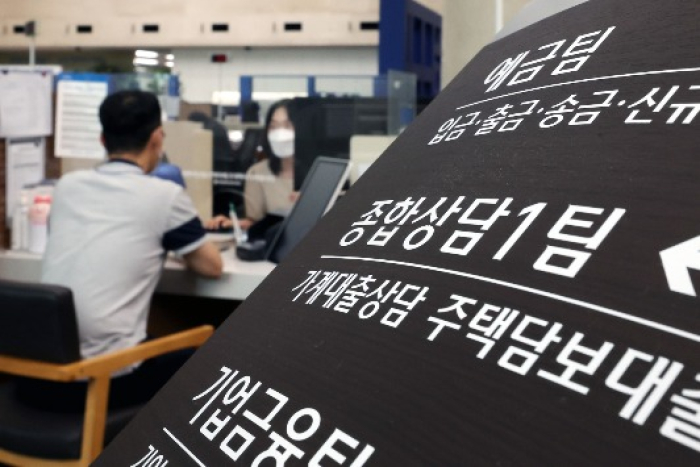Real estate
Korea’s financial exposure to real estate nearly doubles in 10 years
Total financial exposure to real estate stands at about 2,900 trillion won, nearly 50% of which is extended to households
By Oct 13, 2024 (Gmt+09:00)
3
Min read
Most Read
LG Chem to sell water filter business to Glenwood PE for $692 million


Kyobo Life poised to buy Japan’s SBI Group-owned savings bank


KT&G eyes overseas M&A after rejecting activist fund's offer


StockX in merger talks with Naver’s online reseller Kream


Mirae Asset to be named Korea Post’s core real estate fund operator



South Korea’s financial exposure to real estate has nearly doubled over the past decade, with lending to households making up about half. The trend is raising concerns that such risk could further grow now that Asia’s No. 4 economy has joined major economies on a monetary easing cycle.
According to Bank of Korea (BOK) data obtained by the Rebuilding Korea Party’s lawmaker Cha Gyu-geun on Sunday, Korea’s total exposure to real estate by banks and other financial institutions reached 2,881.9 trillion won ($2.13 trillion) as of the end of the first half of 2024 compared with 2,837.6 trillion won as of the end of 2023.
That is equivalent to about 115.9% of the country’s nominal gross domestic product.
Financial exposure to real estate is measured by combining loans extended to households including mortgage-backed loans, corporate loans including real estate project financing and other money injected in real estate investment products.
After Korea’s central bank on Friday cut its benchmark interest rate by a quarter percentage point to 3.25%, the lawmaker warned that the country’s real estate exposure could grow further and asked for stricter management of financial exposure to the country’s mounting household loans and project finance.

The Bank of Korea also voiced concerns about the country’s financial stability after its first benchmark rate cut in more than four years. It hinted at gradual and small cuts ahead intended to slow easy money growth, after the country’s household borrowings hit a record high on high mortgage loans in the second quarter of this year.
INCREASING HOUSEHOLD DEBT
Korea’s financial exposure to real estate has nearly doubled through the end of June this year compared with 2015 when it reached 1,443.5 trillion won.
It has increased every year over the past 10 years. After topping 2,000 trillion won for the first time in 2019, it grew to 2,265.9 trillion won in 2020, 2,540.8 trillion won in 2021 and 2,736.1 trillion won in 2022.
Starting last year, household lending also started to pick up after falling amid the high-interest rate environment of the previous years.
It reached 1,424.7 trillion won as of June, up 20.7 trillion won from the end of last year and taking up 49.4% of the country’s total real estate exposure.
After peaking at 55.3% in 2015, the country’s household lending exposure steadily dropped to 48.2% in 2022.
But it ticked up to 49.0% at the end of 2023, and then rose further to 50.6% in the first quarter of this year and 50.7% in the second quarter.
In view of the country’s increased housing transactions and mortgage loans in the second half, total mortgage exposure is estimated to have further increased.

Over the same period, loans extended to corporations stood at 1,085.6 trillion won as of end-June this year, accounting for 37.7% of the country’s real estate exposure.
That figure fell to 38.2% in 2023 from 39.9% in 2022.
NEED TO MONITOR THE HOUSING MARKET
Household lending rapidly increased in the second quarter on lower borrowing costs reflecting expectations of cuts to the BOK's benchmark rate later this year.
The number of units transacted in the housing market increased 23% to 171,000 in the second quarter on top of a 6.1% gain to 139,000 in the first quarter.
In response to the country’s rapid rise in mortgage loans, the Korean government began tightening the country’s mortgage lending regulations in the second half, forcing the country’s commercial lenders to follow suit.
The move succeeded in cooling down the housing market somewhat and the rise in apartment prices in Seoul started slowing in September, according to the Korea Real Estate Board.
Bank of Korea Governor Rhee Chang-yong, however, said on Friday after the rate decision meeting that it is still early to confirm the country’s financial stability.
“The bank will monitor how the rate cut affects housing transactions and the rising pace of housing prices,” said Rhee.
Write to Jin-gyu Kang at josep@hankyung.com
Sookyung Seo edited this article.
More to Read
-
 Central bankBOK flags more rate cuts but in gradual, small steps
Central bankBOK flags more rate cuts but in gradual, small stepsOct 11, 2024 (Gmt+09:00)
3 Min read -
 EconomyKorea’s household debt hits record high on mortage loans
EconomyKorea’s household debt hits record high on mortage loansAug 20, 2024 (Gmt+09:00)
2 Min read -
 Central bankBOK chief signals rate cut; warns of rising housing prices
Central bankBOK chief signals rate cut; warns of rising housing pricesJul 11, 2024 (Gmt+09:00)
3 Min read -
 EconomyS.Korea’s July household debt grows at fastest pace in over 3 years
EconomyS.Korea’s July household debt grows at fastest pace in over 3 yearsAug 01, 2024 (Gmt+09:00)
2 Min read -
 EconomyKorea’s household debt growth at 5-month high on mortgages
EconomyKorea’s household debt growth at 5-month high on mortgagesMay 13, 2024 (Gmt+09:00)
2 Min read
Comment 0
LOG IN


